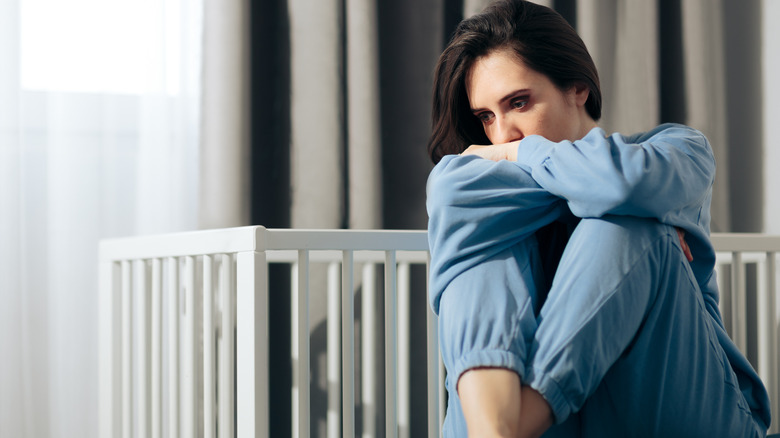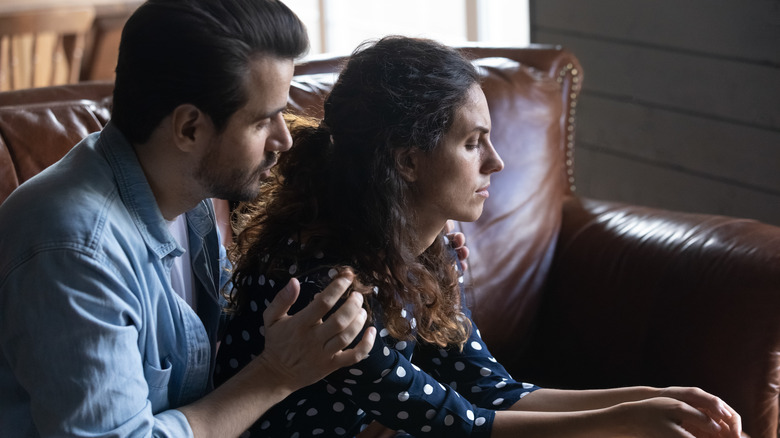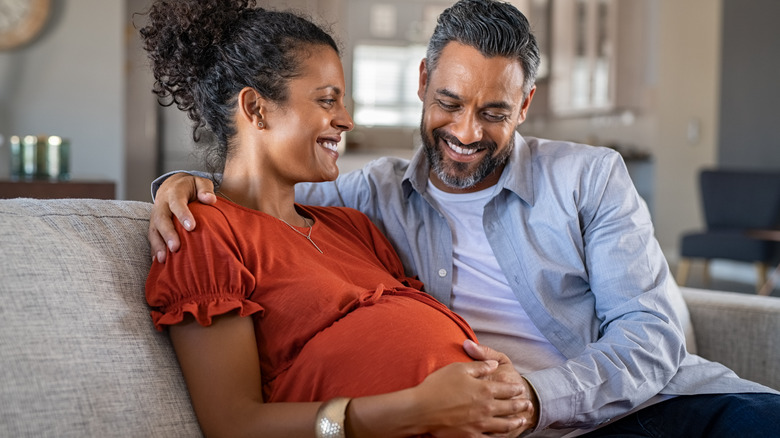Miscarriage Myths You Have To Stop Believing
The decision to have a baby is a big one — filled with excitement, hope, and expectation. But it can also be wrought with fear, doubt, and more often than we know, the terrible heartache of loss.
Miscarriage is defined as the spontaneous loss of pregnancy occurring before the 20th week of gestation, according to Mayo Clinic. While it's estimated that between 10% and 20% of pregnancies end in miscarriage, the actual number is assumably significantly higher, as most miscarriages occur so early that many women don't even realize they were pregnant.
Early pregnancy loss may be fairly common, but the subsequent devastation that comes with it is anything but. And obstetrician Zev Williams told Livescience that the general "rule" of waiting until the end of the first trimester to announce a pregnancy only contributes to the notion that miscarriage is taboo — lending to more pain, isolation, and misinformation.
Misinformation can be dangerous, especially when it's being delivered to people in a position so vulnerable. There's a great deal of myth surrounding the topic of miscarriage and we're here to bust up five of the biggest ones right now — for your healing and your peace of mind.
Myth # 1: Miscarriage is the mother's fault
After a miscarriage, women might experience feelings of shame and guilt, believing that their loss is of their own making. They worry, "It must have been the morning coffee I had, or those glasses of wine I drank before I knew I was pregnant. I wasn't sleeping enough and I forgot to take my vitamins." In fact, a 2020 survey conducted by Tommy's revealed that a whopping 82% of families blamed themselves when they lost a baby to miscarriage.
However, Dr. Evangelia Elenis tells Livescience that a woman being at fault for a miscarriage is rare. Most early miscarriages occur as a result of chromosomal abnormalities. Natera explains that it's common for errors to occur during the formation of egg or sperm cells. This could lead to too few chromosomes or improperly formed chromosomes, often making it impossible for a fetus to grow past the first trimester. In these cases, there is absolutely nothing anyone could have done to prevent it. And while the term "chromosomal abnormalities” might sound alarming, Dr. Elenis assures us that no woman is in possession of only healthy eggs. When an unhealthy egg does implant, a miscarriage follows (per Livescience).
Late miscarriage, or the loss of pregnancy after 20 weeks, is most often caused by an issue with the fetus's development, which can also be attributed to chromosomal abnormality, according to Healthline. Physical conditions including immune disorders, preeclampsia, thyroid conditions, and infection can also cause late miscarriage.
Myth #2: One miscarriage means you'll have another, multiple miscarriages means infertility
The trauma of a miscarriage can incite fear and stress in families trying to start again. Many women who get pregnant again after suffering a miscarriage are terrified to get too comfortable, thinking everything they do might cause another one. However, Mayo Clinic notes that the risk of miscarriage stays the same after one miscarriage, and most women will go on to experience a totally normal pregnancy. Only 1% of women will experience repeated miscarriages.
While those who do experience a second miscarriage have a higher risk of experiencing another, registered midwife Kate Taylor says that having multiple miscarriages by no means indicates that you're infertile (per Livescience). Dr. Elenis adds that with each miscarriage, the risk of suffering another due to chromosomal abnormalities decreases, and with that, the likelihood that the miscarriages are caused by an underlying condition increases. "After two or three, you should always consult a doctor and have a miscarriage investigation conducted before trying again," Dr. Elenis suggests.
Verywell Family points out that if recurrent miscarriages are occurring due to a treatable condition, addressing the root cause with medical treatment can greatly improve your chances for a healthy pregnancy in the future.
Myth # 3: Physical and emotional stress cause miscarriage
The idea that physical or emotional stress can cause miscarriage is a common misconception that can add to parents taking the blame for a lost pregnancy. According to a 2015 survey published in Obstetrics & Gynecology, 76% of respondents believed emotional stress could cause a miscarriage, and 64% thought lifting a heavy object could end a healthy pregnancy.
A 2013 study published in the Scandinavian Journal of Work, Environment, and Health concluded that the risk of miscarriage did increase in women who lifted heavy loads more frequently, and as the total weight lifted increased throughout the day. When speaking with Livescience Dr. Hana Patel warned, "In the first 12 weeks of pregnancy, it is advisable to avoid heavy lifting, as there is a small risk of miscarriage, thought to be related to the pregnancy hormones causing the pelvis and ligaments to relax."
However, most experts agree that physical stress — like exercise or picking up a reasonably heavy object — won't increase the risk of miscarriage (per Parents). On the contrary, exercising while pregnant can contribute to a healthy pregnancy, as it lowers the risk of gestational diabetes, can relieve pregnancy-related pain, and helps manage stress.
Speaking of stress, no evidence exists suggesting that everyday stress or a bad argument with your partner can contribute to a miscarriage. While stress can elevate blood pressure, which can affect pregnancy, stress is unlikely to be the direct cause of a miscarriage (per Livescience).
Myth # 4: You should keep news of a miscarriage to yourself
The stigma surrounding miscarriage leads many women to believe it's something they should be ashamed of. For that reason, among many others, most women keep the pain of their loss to themselves.
A 2018 survey published in BMC Women's Health found that while some women expressed their partners were their chief support person through their miscarriages, many others reported that an impenetrable silence seemed to surround the topic of miscarriage, keeping them quiet about their own experiences. This only exacerbates mental health struggles. Another 2017 study published in Archives of Women's Mental Health reports that feelings of grief, bereavement, and emotional numbness can continue for years after a miscarriage, especially in women who don't receive proper support from medical professionals.
In the 2015 survey published in Obstetrics & Gynecology, 28% of women reported finding comfort from celebrities who discussed their own miscarriage, a number that increased to 46% when friends or family opened up about their experiences. Who you tell about your pregnancy loss and when you tell them is your decision alone, but talking about it can help. If you don't feel comfortable confiding in anyone close to you, seek advice from a grief or pregnancy loss expert.
Myth # 5: After suffering a miscarriage, you have to wait a few months before trying to conceive
After a miscarriage, many women hope to try again as soon as possible. While women should wait at least two weeks after a miscarriage before engaging in sex in order to prevent infection, they can ovulate and become pregnant again shortly after that (per Mayo Clinic).
The World Health Organization previously urged women to wait six weeks or longer after a lost pregnancy before trying again. However, a 2010 systematic review published in BJOG contradicts this, finding that women who conceived within six months of a miscarriage experienced a 20% reduction in the risk of another miscarriage. Another study published in BMJ reported that out of 30,000 women who became pregnant after one miscarriage, those who conceived before the six-month mark were less likely to have a miscarriage than those who tried later.
As periods can be a little more unpredictable after a miscarriage, Tommy's reveals that many doctors advise women to cycle through one period before trying again to reduce confusion surrounding the date of conception. However, if the miscarriage wasn't due to a health condition that requires management before a healthy pregnancy is possible, deciding when you are physically and emotionally ready to try again is entirely up to you.






